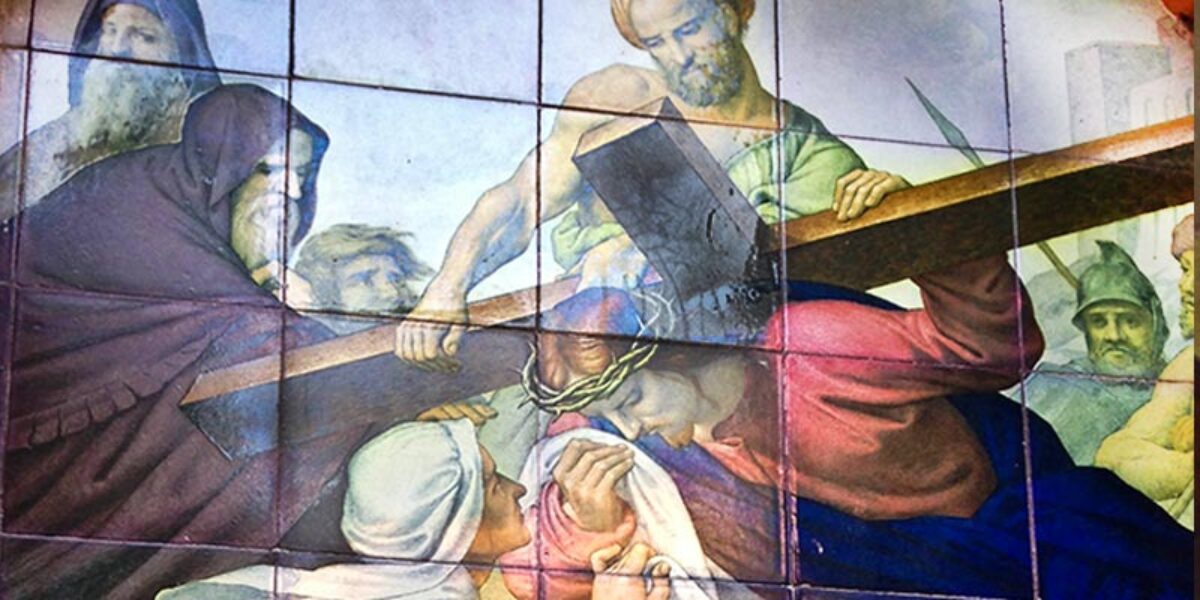Editor’s Note: The Spiritual Exercises
developed by Ignatius of Loyola were written to challenge you and me to
experience the Bible in a new way. As you contemplate a passage, use your
imagination to enter the scene as an active participant—as one of the
characters in the story you are reading. The goal of the Spiritual Exercises is
to reflect more deeply on how God works in our lives today.
The meditation below came out of my
contemplation of Luke’s narrative of the events of Good Friday nearly
2,000 years ago. As I contemplated the passage of
Scripture, I used my imagination to enter the scene of the
crucifixion. A conversation with Jesus ensues, and I listen
carefully to his response. To start your own experience of engaging with
Scripture, check out the online devotional tool
Journeys or the Lectio
Divina
guide to regular, contemplative Bible
reading.
I am the woman with the hemorrhage who wanted only to touch
his cloak to be healed. What I got was so much more: honor, respect, kindess,
love. I followed him from that day on because I was nothing without him.
I follow him now on the way to the cross.
He stands trial as the crowds yell, “Crucify him! Crucify
him!” He looks diminished, exhausted. I, along with a small group of devoted
women, have been standing sentinel outside the high priest’s house, the chill
of the early spring night evaporating in the morning sun.
As the shouts intensify, I begin to rage: “How can you say
this?” My voice gets lost in the din, as I run from one person to another.
“Just a few days ago, you honored him! Now you want to kill him?”
A man pushes me. I lose my footing and fall. I scramble to
my feet and hear the sentence: Jesus is condemned to death by crucifixion.
The next time I see him, I barely recognize him. A crown of
thorns streams blood down his swollen face. His left eye is sealed shut and his
body is scourged, lashed in hundreds of lines that leave gaping wounds on his
body.
Jesus stumbles forward, unable to carry his cross. A man is pressed into service to carry it for
him. I want to run from his swollen face, his beaten body, his unbearable pain.
But I know I can’t abandon him. I can never abandon him.
When we reach Golgotha, guards throw him to the ground, the
thorns stabbing his head anew. As the nails
are driven through his hands, I hear him moan. I can’t bear to see him suffer. I
want to flee. But I don’t.
The cross is hoisted into the air and they nail his feet,
one on top of the other. Again, I hear him moan.
They taunt him: “Save yourself if you are the king of the
Jews.” I break from the women and begin to pound the chests of those who mock
him. “Leave him alone!” I scream. “Leave him alone!” Again, I am tossed to the
ground.
Darkness gathers. He utters a cry: “Father! In your hands, I
place my spirit!” There is a great noise, as if the earth is groaning in
protest. But I look only at him. He no longer strains against the wood.
He is taken from the cross, and we huddle around his
lifeless body. Some wipe the blood from his face. Others gently pry the thorns
from his head. Each of us is lost in our last acts of love.
He is placed in a tomb, and we are urged to leave quickly
because the Preparation Day is upon us. Two of the women help me walk, their
arms holding me steady.
I vow to return to anoint his body with spices and perfumes.
Then I will say goodbye.
Jesus speaks to my heart: “This isn’t the end of the story.”





